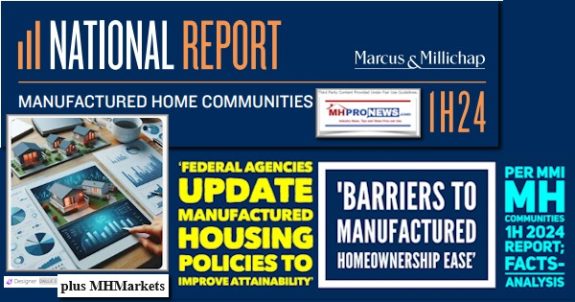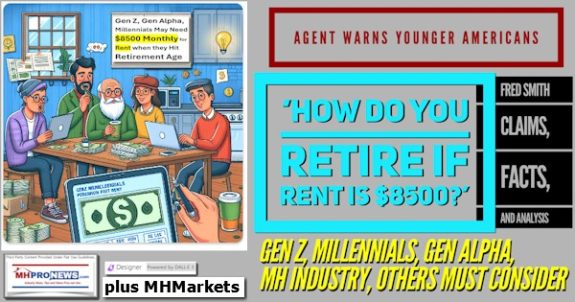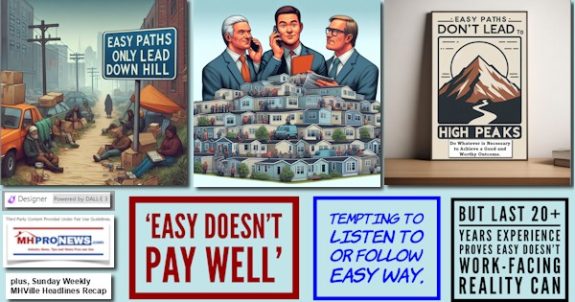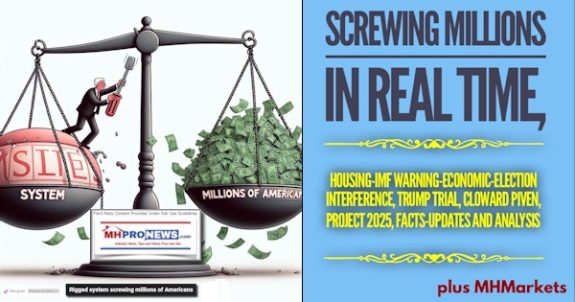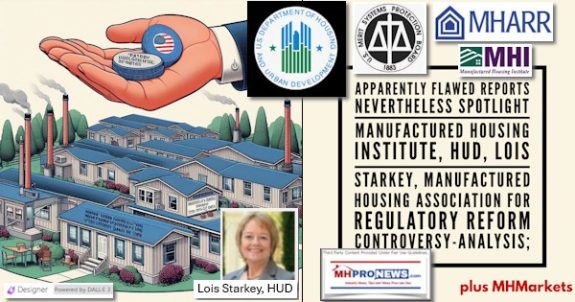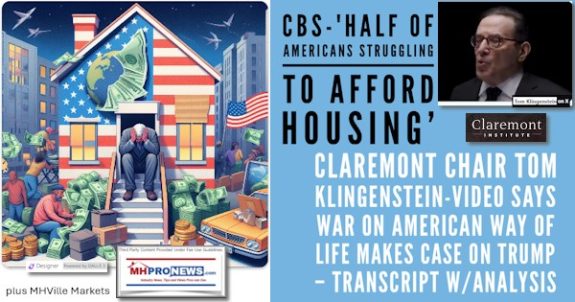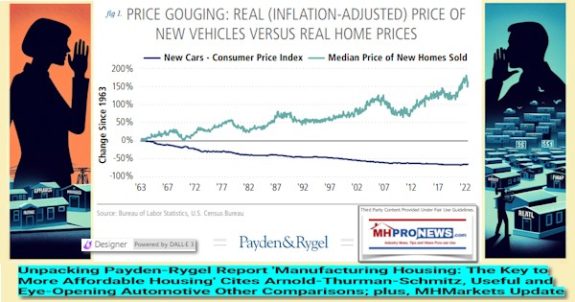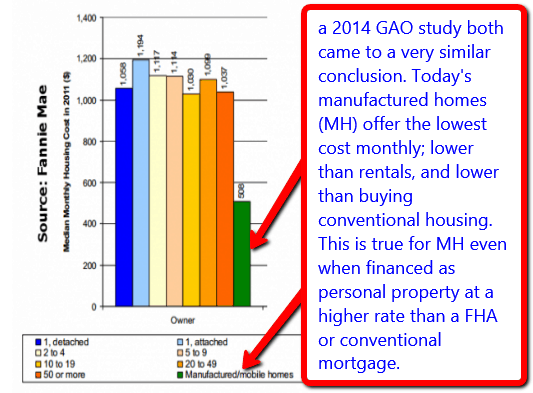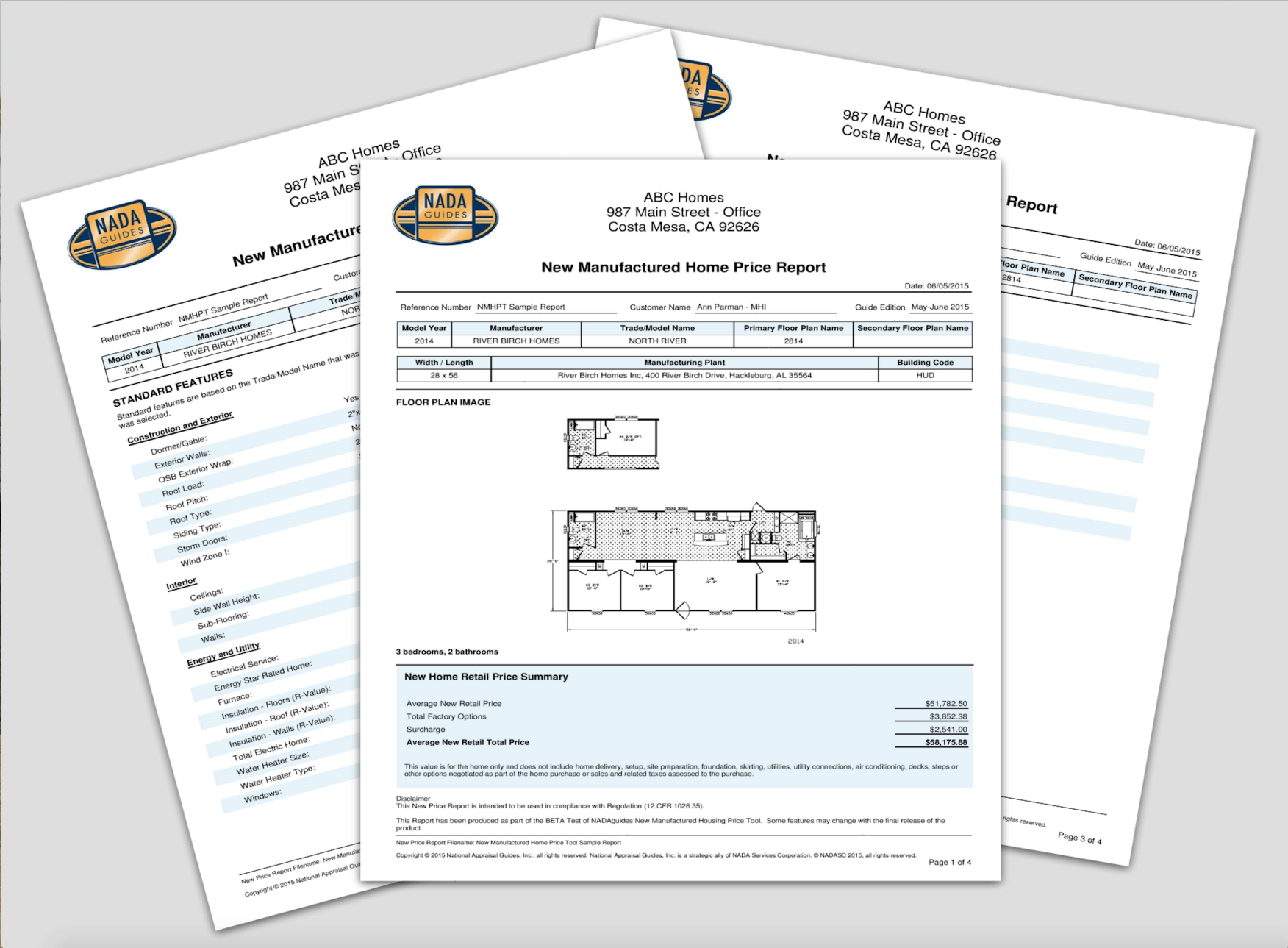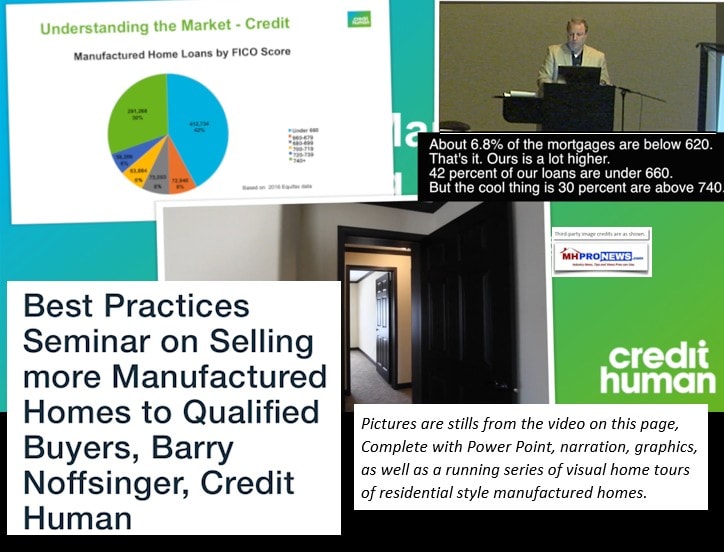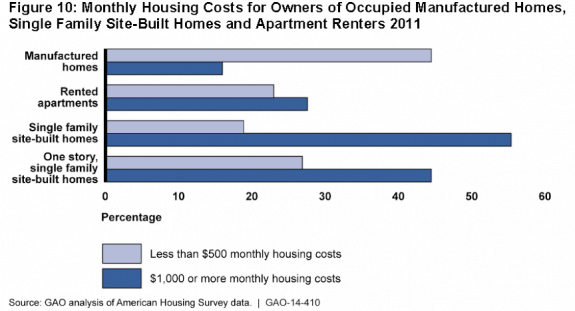Exclusive MHMSM.com Industry In Focus Report
The March 2011 IBISWorld report that cited manufactured home dealers as a ‘dying industry’ has made news inside and outside of the manufactured housing industry. MHMSM.com has contacted a variety of Industry leaders and personalities from coast to coast to get their comments. On-the-record comments have included national association leaders, as well as professionals in factory-built housing from the manufacturing, retail, communities and lending sectors.
Messages, comments and calls to MHMSM.com from manufactured home industry professionals dribbled in at first, and then gained in volume as publications such as The Atlantic and Business Insider covered the IBISWorld report. As an example of mainstream media coverage, a TV station in Houston reportedly called a regional firm to interview them about the developing IBISWorld story.
Derek Thompson, associate editor at The Atlantic, penned a commentary that included these words:
“At the center of a perfect storm of boomer burnout, a brutal recession,
and a rapidly changing industry, the mobile home retail market
could be the worst industry in America. Here’s why.”
“If I asked you to name America’s least fortunate industry, your mind might go to record stores, obliterated by on-demand apps; or photofinishers, left in the cold as digital cameras turn Americans into our own photo editors; or fabric makers, where business is booming … in Shenzhen, China.
“But when it comes to unlucky industries, it’s manufactured home (aka mobile home) retailers who really hit the trifecta. First they missed out on the housing boom. Then they felt the gut-punch of the recession. Now they might yet miss out on the recovery. That makes them America’s fastest dying industry, according to a new report from IBISWorld.”
Paul Bradley with Resident Owned Communities USA (ROC USA) was one of the first in the manufactured housing world’s leadership to publicly respond to this IBISWorld report. Bradley wrote a feature article for MHMSM.com that analyzed the IBISWorld report. Quoting from Bradley’s analysis:
“The (IBISWorld) report states ‘demand is dwindling’ and ‘sales are stagnant because the industry is not innovating, and that sales are likely to continue falling in the coming years.’ They go on to say, ‘Manufacturers have made cosmetics changes to manufactured homes, but they have not been significant enough to alter their life cycle stage.’ The report puts MH retailers in the ‘Industry stagnation’ category of declining industries.
“Are you kidding me? These are ‘deeply researched answers’?
“First, the headline clearly comes from their marketing division as a means of grabbing headlines. The research is not about a dying industry but a declining industry segment – one of two long-standing distribution channels in the business.
“With MH shipments in 2010 at 50,000 or 20 percent of 2000 levels, it’s not news that retailer revenues over that period declined. On that data, I’m surprised establishments are not down more than 56 percent. It suggests that the segment has excess capacity and additional closings are likely.
“Most surprising to me is laying the blame at the feet of manufacturers on the issue of design! From a ground-level market vantage point, that’s misplaced.
“The industry’s great declines came about as a result of, first, an industry-created chattel collapse where the seeds were sown in run-up to the 373,000 shipments in 1998. The collapse, and the repossession overhang which followed, began the decline like a skilled boxer’s well-placed left jab.
“The right overhand came next in the form of aggressive sub-prime and predatory lenders in the site-built market. In that run-up, traditional MH buyers – who were harder to finance for MH as a result of the chattel collapse – were lost to site-built housing in an eerily familiar boom market.
“Dazed by the right hand blow to our collective heads, the left to the body that has people reeling now is the regulatory reaction – the SAFE act, etc. – to the clearly consumer-eating lending practices of the last decade.
“The results of this three punch combination are declines of the magnitude widely reported and felt, and like a good whack, the pain lasts a while.
“Innovation in housing design, however, is not the industry’s chief failing.
“For those of us in the community market segment, in fact, innovation in new homes is a small issue – not a non-issue but a mere shadow of the aforementioned home financing issue. In fact, we are seeing demand for replacement and in-fill homes but only where we are able to arrange decent home financing. People want more efficient homes and the cost savings with new EnergyStar homes can be dramatic based on buyers with whom I’ve spoken.”
(Editor’s Note: The complete analysis by Paul Bradley can be found at this link.)
Other commentary in the form of articles proposed for publication, private and public comments followed. Thayer Long at the Manufactured Housing Institute issued this email as part of his response:
“State Execs & MHI Board:
“A very well articulated response to the IBIS report from last week by Paul Bradley which was just posted on www.MHMSM.com.
“I’d also just add that the sentiment at the Tunica Show, the Louisville Show, and the expected strong turnout at the Congress & Expo and the Tulsa Show and York Show later this month certainly don’t indicate this industry is going anywhere.
“Tony/Paul – I hope you don’t mind me sharing. We’ll see you in Las Vegas. Thanks for your support.
“Thanks-
“Thayer”
MHMSM.com spoke with Danny Ghorbani at the Manufactured Housing Association for Regulatory Reform (MHARR) and to Thayer Long at the Manufactured Housing Institute.
Danny Ghorbani stated in a telephone interview that his comments were not the official position of MHARR, but represented his own views on the IBISWorld report and related.
Ghorbani stressed that the IBISWorld report represented the “failure” of “the post-production sector of the Industry” [meaning, MHI] in “serving that segment of its membership.”
The MHARR official then referenced two previously published documents that do represent MHARR’s official position, which were previously published on MHMSM.com in August and October 2010. These MHARR Viewpoint articles called for ‘the post-production segments’ of the manufactured housing industry to form their own national association; a thinly veiled vote of no-confidence from MHARR towards MHI.
MHMSM.com spoke extensively with Thayer Long at the Manufactured Housing Institute (MHI). The typically soft-spoken Long was quick to respond.
Long was at times tongue-in-cheek, at other points direct in his comments about the IBISWorld report and Ghorbani’s often pointed comments on the matter. It should be stressed that Long’s comments, which follow, should be viewed as his own, and not necessarily reflective of the official view of MHI.
In an exclusive interview with MHMSM.com, Long shared the following thoughts:
Thayer Long:
“If it is a dying industry, then ok, then I guess I quit! And if Danny wants to blame it on us [MHI], okay, what else is new? … I am still struggling to figure out what he (Danny Ghorbani) is doing right now. Name one thing that he has accomplished … in the past three years? What has he accomplished…? I would love for you to think about that and get back to me. What has he accomplished? We [MHI] win and lose some battles. But at least we try. We have accomplished some things. Except, except, except… [MHARR]…nothing….
“You caught me on a good day.
“That said, for ‘a dying industry,’ the numbers for Vegas [the annual MHI Congress] are looking outstanding. We are looking great. For ‘a dying industry,’ I heard from manufacturers that the Tunica Show was good.
“Show me ‘a dying industry.’
“We are pacing ahead for community owners and retailers; we are pacing ahead for our attendance [at MHI Congress in Las Vegas] from last year.
“We’ve got more exhibitors than we did for last year.
“We have more manufacturers coming than we did last year.
“So, for a dying industry, we really are taking it on the chin, aren’t we?
“Aren’t you glad you get this unfiltered Thayer sometimes?
“I ask that in all seriousness [about Danny and accomplishments]. Maybe we had this conversation at the end of last year.
“We [MHI] throw out our score card every year. Judge us on that; judge us on our accomplishments. Judge us on that… I would love… I think frankly all associations should do that…’ what’s your score card?’ Put it up against anyone else… I would love to see Danny’s [MHARR’s] score card.
“Now this is the problem.
“What Danny is going to say is ‘that no matter what they [MHARR] try to do, MHI is going to try to undermine them [MHARR]. So it is an unfair question.’ We are the ‘big bad MHI’ that ‘represents large manufacturers,’ which is not true. You can go on our website and see that we have single plant operators just as much as Danny [MHARR] does.
“Anything he tries to do, we ‘undercut him [Danny Ghorbani], we undermine him.’ That’s not fair. So that’s what he is going to play. We can do no right, in other words [with respect to Ghorbani’s perspective].
“It is kind of like this whole IBIS thing; who are they?
“Okay, fine, they [IBISWorld] publish this report. Okay, it makes a headline; it will circulate around the Industry for a while. You know, people in this Industry should know better. They should just delete it. They should just move on.
“I’m mean, come on. I’ve got this forwarded by a bunch of state execs. You know. It is almost like comical, we can chuckle about it. Come on, really?
“What does IBIS do? What do they know? I’m not going to sit here and worry about it. It is ridiculous. You know, it takes up too much…(time)…I’m glad we are talking about it, but it is what it is. Tough. Let’s move on.
“So we are ‘a dying industry,’ come on, give me a break.”
MHMSM.com: If it wouldn’t be for Communities…
“Yeah, Communities are retailers.”
MHMSM.com: What percentage of sales is going into communities?
“Probably, relatively not the majority.”
“How many communities are buying new? I’ve got to think that a big community [operator], like a Hometown [America], they will be lucky to do maybe 400-500 new homes a year. But that is a nice account for a manufacturer. That is a good question…
“We [MHI] could poll some of the folks. Do a little bit of sleuthing… [Maybe] about 1/3 [of total shipments].
“What was their point [IBISWorld]? That the Retailers are dying? Or that the Industry is dying?
“One could look at that very objectively and say that the industry is evolving into something different.
“You’ve got Clayton, which is more vertically integrated. You’ve got communities that are… picking up more of the slack.
“You’ve got business off… this goes back ten years. MHI really, really pushed this… a lot of manufacturers are starting to chase the builder-developer market.
“I talked to the large manufactures at the Tunica show, and that is where they see the future of the Industry. You will always have a retail market. But maybe the future of the Industry will be more of a builder-developer market [model].
“If you look at this completely objectively, you could just say that the Industry’s model is just changing a little bit. Fewer retailers, but larger. I mean, look at the RV business. I talked to my counterpart at the RVDA… we meet once a month. RV dealers are very concentrated. One RV dealer serves a very big market area. Maybe that’s the model. If that is a change occurring in the market place, is that a failure on the part of any one organization? Or group or people? It could just be the way that the business is evolving… is another thought that I had. To say that it is dying…
“…You know where I come down on that.
“I remember Ross [Kinzler’s response] on this [Danny’s argument that there should be a post-production and production sides of the Industry]…
“If he [Danny Ghorbani] is saying that the post-production side of the Industry is failing retailers, then I guess I could argue that the production side is also failing retailers and community owners. Because doesn’t the production side need the post-production side to get to market?
“Maybe some of the production guys, some of Danny’s production guys, better step up if they want to have a distribution outlet instead of just trying to divide the Industry.”
Dovetailing with Long’s comments, as noted above, was this excerpt from The Atlantic:
“…A new trend in mobile homes is for manufacturers to open their own outlets, so that retailers are bypassed.
“‘I actually think the next six years are going to shape up for [mobile homes] really well,’ said Thayer Long at the Manufactured Housing Institute. ‘People are looking for smaller homes, and dollar-for-dollar, we offer the best house.'”
MHARR and its officials made no comment to Thayer Long’s statements and questions pointed in their direction. However a source close to MHARR stated on condition of anonymity that they effectively do keep a score card, and they publish it routinely through press releases as their activities take place.
Arguably MHI’s most award-winning retailer, Doug Gorman of Home-Mart in Tulsa OK, had the following to say in public commentary on the IBISWorld and related national association topics.
Doug Gorman:
“I certainly do not have the credentials to refute the recent IBIS report that labeled the manufactured housing industry as being on the verge of extinction. I also approach the subject with some trepidation as I majored in Marketing and I am keenly aware that most of the buggy whip manufacturers are no longer in business. In order to accept the results of the report from a market demand stand point, we would have to arrive at the conclusion that the demand for new homes priced below $70-100 a square foot will become no longer significant. We would also have to accept that this disappearance of market demand will occur as down payment requirements are poised to increase to perhaps 20%, while terms may be reduced to as low as 15 years. In the face of enormous down payment requirements and shortened terms for repayment, suddenly prospective home buyers are going (to) pass over housing opportunities in the $20 to $40 per square foot category? (Editor’s note: meaning HUD Code manufactured homes)…
“We have had to endure ongoing discrimination of the allocation of lending resources even when the [federal] Duty to Serve language is rewritten to specifically cite manufactured housing. As a retailer, I do not see any shortage of willing buyers for the homes that we build. We do experience a series of problems related to recent acts foisted upon us by the federal government.
“I observed in a LinkedIn comment earlier that our industry trade organization, the Manufactured Housing Institute (MHI) is constricted by the composition of their membership from assuming the role of a being a strong advocate for individual industry divisions. Retailers would have to form an independent organization dedicated to retailers in order to have someone in Washington, DC truly going to bat on all the issues that retailers face. I don’t see the numbers or the money being there for that to happen. In the mean time, we accept MHI with its wrinkles, knowing that the diversity of the membership does not allow for the extreme dedication to our needs that we would like to have.
“The Manufactured Housing Association for Regulatory Reform (MHARR) serves in that capacity for independent manufacturers and manufacturers need that dedicated representation as they have many issues affecting them that are completely unknown to other industry segments.
“Another theory being floated by some industry members is that a conspiracy is in play to undermine the effectiveness that the HUD Code provides and bring about its demise. If that theory is true and if the conspirators have enough influence, market demand will not matter. I am not smart enough to know whether or not a conspiracy exists to destroy our industry. I would say that if it does exist, it is experiencing reasonable success.
“We do face very difficult times as an industry. I have quipped on more than one occasion in the past few years that “absence of stress is death…and I am very much alive.”
“As an industry, we have taken a beating for the last twelve years. Some of that has been our own doing and some from lack of fairness by government actions or inactions. If a conspiracy does in fact exist, I am too small a player to have much impact on stopping it. Absent a conspiracy, our company plans to move forward and provide our clients with great values in housing and outstanding customer service. Hopefully our industry can see itself through the balance of any remaining down turn and see an increase in shipments in the years ahead.”
(Editor’s Note: for the complete article by Doug Gorman on this topic, please go to this link.)
Among non-HUD Code factory builders responding to this IBISWorld controversy, Otis Orsburn of hybridCore Homes had this to say in a recent article:
“More importantly, how will manufacturer’s respond with product evolution that buyers, lenders, and appraisers will support? The Manufactured Home Dealer network has historically been a successful channel of distribution for manufacturers. Without it, sales numbers will continue to dwindle and more manufacturing facilities will close. There are thousands of capable career professionals working at these Dealerships. Product innovation and development could resuscitate the patient and stabilize an industry that, by the opinion of those that report to business decision makers, is a dying breed. Does this new widget rise from the ashes as a manufactured home?…” Read The Death of an Industry (or not).
Industry observer
Steve Gulik
of SGDesign had this to say in a posted comment:
“Marketing is perspective. The current perspective obviously needs to be changed. On Retailer lot homes should be displayed in a manner so they mimic their site built competition (raised parameter or sunken base area would be ideal). Retailer websites should reflect the same commitment and professionalism / investment stick-built tract homes produce.
“The golden ticket may be a new market wide re-branding. A new product title. A different buzz word. For instance, ‘cloud computing’ … which is an enigmatic word that in reality is a simple re-branding of ‘shared resources’. It’s fresh, it sounds new but is simply a distributed network method that has been around for a years.”
In another post, Gulik stated:
“Retailers need adapt or face the plight of any business not keeping up with the times. Being that so many retailers are entrenched in the methods of the past, this gives greater opportunity to those that embrace change as an opportunity.
“For instance, how many Retailers still expect walk-in traffic as their main means of sales? How many do not have viable websites that list their current listings? How many understand that SEO is just as important as having a website (if you don’t come up on the 1st page of Search Results, you virtually don’t exist).”
MHMSM.com’s own IT and WebTech Manager, Bob Stovall, has also sounded off on the topic.
“Not only do the factories need to keep up with the latest technologies, everyone in the sales chain needs to also. Retailers and communities that refuse to communicate with their customers using the new tools will fall by the wayside.
“Those who believe that using the new technologies is only for the very young are not only missing the opportunity to acclimate a new generation (one that doesn’t yet subscribe to past stereotypes) to the benefits of factory-built housing, they are also thumbing their noses at another huge potential market of retiring baby boomers. People 55 and over now constitute the biggest growth segment for Facebook.
“Those who haven’t seen our ‘Dominate Your Local Market’ presentation yet, need to know we’ll be presenting it at Congress in Las Vegas and at the Great Southwest Home Show in Tulsa in just a few weeks.
“Now is the time to have your online marketing strategy thoroughly reviewed with an eye to making more efficient and more cost-effective. That is just one of the things we do here at MHMSM.com to help ensure a healthy future for the manufactured housing industry.
“Please see Website Reviews.”
Factory-built home retailer Dustin Youngdahl had this to say:
“As owner of Youngdahl Homes and someone who grew up in the mobile home…manufactured home…modular home industry, I’m excited about the future. With all down cycles and shakeups newer, better and more creative products & services will arise. The profits at the top of the bubble were great, but the challenges we face now will make us survivors that much stronger, more prepared to better help our clients and smarter at doing all the right things.
“The engineered housing industry will only grow and improve because our quality & efficiencies cannot and will not be ignored. The stereotypical metal on metal mobile home will be equated with great grandma & nostalgia rather than present day reality. The future of factory built housing is at the intersection of efficiency, quality and creativity.”
Ken Rishel, of Rishel Consulting, regarding this controversy, said in part as follows:
“This issue is another version of the blind men and the elephant. Based on what we do, we see different parts of the elephant. That retailers are dying out should be of no surprise to anyone as it has been happening for years.
“I would disagree that the manufacturers are solely responsible, especially based on their build quality. Manufacturers (in general) can turn out products superior to stick built today. They turn out what their market (retailers) thinks they need. They are, market driven, and they build what the retailers will buy, because they are not able to operate a push – pull marketing operation. ”
Chiming in on the controversy was veteran HUD and Modular home producer, Harry Karsten of Karsten Homes. Responding to a publicly posted comment, Karsten said:
“Otis,
“Very well written. I disagree with your analysis of the problem. The products in many markets are well designed and very suitable for conventional home buyers. The problem lies with the disconnect between the manufactured home and delivery to the site, available sites, financing etc. There may or may not be a demise of retailers but it won’t be because of lack of innovation.
“Harry Karsten”
Modular and HUD Code producer Steven Lefler from Modular Lifestyles has been among the many others who have sounded off publicly and privately on this topic. Association leaders, rank-and-file industry members, owners, stockholders and employees have all been part of the strongest response to an Industry-related topic since the Haitian earthquake crisis last year.
No doubt the HUD Code home industry has its challenges. Some scoff at the concerns that the IBISWorld report has raised. Others express concern, manifest in the many calls and comments we have received on this topic. Some today are profitable and are even growing, while other firms struggle to survive. ‘Now is the time for all good professionals to come to the aid of their Industry.’ # #





